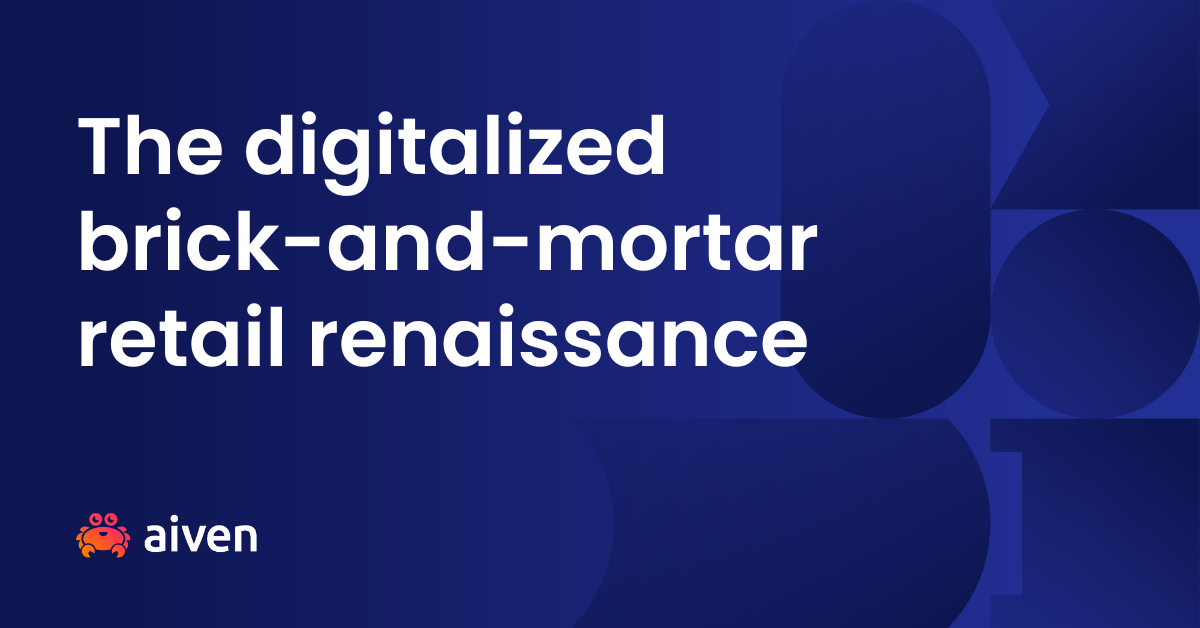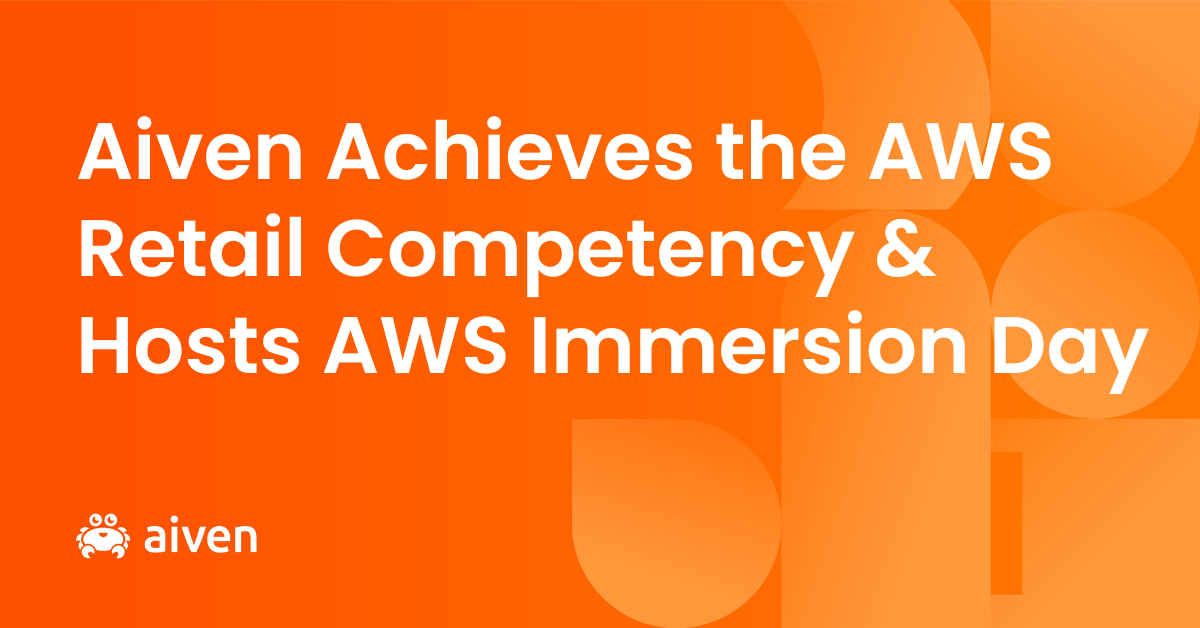Sep 11, 2024
Retail Detail: How AI Leverages Real-Time Data to Unlock Revenue Potential
Real-time intelligence is no longer a nice-to-have, but necessary to attract customers and build future-proofed retail operations
John Kennedy
|RSS FeedHead of Databases, Product at Aiven
In the last 15 years, we’ve seen slow but significant advances in AI when it comes to retail. We can all remember when AI-powered “bots” or virtual assistants began showing up on most major retail websites to assist with consumer questions and complaints.
Today, it’s having a major impact on everything from reducing shrinkage and theft to personalizing the shopping experience for customers.
AI demonstrating success in retail
AI has empowered retail businesses with really good data and information leading to remarkable success. In a recent study, retailers using AI reported seeing sales more than double expectations in 2023 and anticipated a 3X increase in 2024 compared to their competitors.
It should come as no surprise then that the global AI in retail market size is projected to grow to more than 85 billion USD by 2032. In fact, 40% of retailers are already leveraging intelligent automation technologies, with 80% expected to adopt it by next year. For retailers, there are three clear priorities for AI adoption: better CX (59%), higher productivity (49%), and cost efficiency/ ROI (44%).
Realizing the potential impact of AI in an omnichannel industry where consumer expectations around experience, stock availability, and delivery times are high means one thing: real-time.
Processing data right now, not tomorrow morning
The retail landscape is rapidly changing and globally interconnected. For the businesses operating in this ecosystem, it means every change needs to be reflected in the data. But, because of the way the ecosystem is designed, updating the data quickly is a consistent challenge for retailers.For example, processing an online order requires the retailer to rapidly verify inventory, authorize credit card payments, confirm shipping, initiate billing, and send order confirmation, all within seconds.AI is completely changing the playing field and leading to massive improvements in day-to-day operations.
Retailers are using AI to analyze customer behavior and preferences in real-time, which enables them to tailor recommendations, and marketing strategies to individual consumers. This level of personalization not only enhances customer satisfaction, but also boosts sales and customer loyalty.
Applications of AI are also leading to improvements in the shopping experience. For example, cosmetics retailer Sephora uses facial recognition technology to enable customers to experiment with an extensive range of makeup products. Similarly, Google introduced a virtual try-on feature for women’s tops from popular brands.
Beyond the consumer-facing impact, retailers are feeling the benefit in areas like inventory management, where AI is being used to predict demand more accurately, optimize stock levels, and reduce waste. AI systems analyze historical sales data, market trends, and external factors like weather patterns to forecast demand. AI is also revolutionizing supply chain management. Retailers use AI to enhance logistics, from route optimization for deliveries to predictive maintenance of equipment. Real-time data analytics allow for immediate adjustments in supply chain operations, improving efficiency and reducing costs. AI-driven fraud detection is enhancing security and reducing losses for retailers. By analyzing transaction patterns in real-time, AI can identify and flag suspicious activities, helping retailers respond swiftly to potential fraud.
All of this is only possible because the right data is where it needs to be when it is needed.
Seamless success for AI-driven systems
Despite the widespread uptake of AI, retailers can’t just press the ‘buy button’ and expect it to magically fix things. Creating personalized experiences and unlocking efficiency doesn’t happen instantly, and it certainly doesn’t happen without appropriately trained and managed data.
Retailers need to consider the AI models they are using and how they’re built (or acquired). Similarly, they need an infrastructure that enables them to update their AI models and can scale during peak shopping periods. Failing to do so can lead to poor performance, which can have a catastrophic effect on customer spend and loyalty. Aiven’s services, which offer high availability and scalability, are crucial for retailers to maintain these AI-driven systems seamlessly.
ADEO speeds up development times with data
ADEO Group serves 450 million customers in 15 countries via its home improvement brands, making it the third-largest global operator in the retail sector. However, the group was struggling with data siloed across thousands of on-premises repositories and needed to unify it under one cloud data model. ADEO began building its new data ecosystem using Aiven data services running on Google Cloud. With this centralized approach to data, ADEO sped up development times and transformed the way data was connected across its retail network. Regarding this project, Julien Charlot, Head of Databases and Middleware of ADEO, said, “We’re evolving toward a data analytics-based understanding of what we sell in the store to better understand and predict the habits of our customers. We want to connect the services to the goods people buy. So now, the application will really evolve.”
Redefining the way we interact with brands
Today’s retail journeys are characterized by their complexity and timeliness. They combine people, technology, places, and products in different ways — with each component constantly changing. It is AI that is helping retailers adapt.
By embracing AI-driven technologies and leveraging data-driven insights, retailers can create more personalized shopping experiences, optimize inventory management, enhance customer service, and drive innovation across the entire retail value chain. As AI continues to evolve, its transformative impact on the retail industry will shape the future of commerce, driving innovation and redefining the way we shop and interact with brands.
Stay updated with Aiven
Subscribe for the latest news and insights on open source, Aiven offerings, and more.



